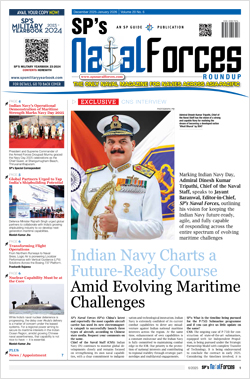INDIAN ARMED FORCES CHIEFS ON OUR RELENTLESS AND FOCUSED PUBLISHING EFFORTS

The insightful articles, inspiring narrations and analytical perspectives presented by the Editorial Team, establish an alluring connect with the reader. My compliments and best wishes to SP Guide Publications.

"Over the past 60 years, the growth of SP Guide Publications has mirrored the rising stature of Indian Navy. Its well-researched and informative magazines on Defence and Aerospace sector have served to shape an educated opinion of our military personnel, policy makers and the public alike. I wish SP's Publication team continued success, fair winds and following seas in all future endeavour!"

Since, its inception in 1964, SP Guide Publications has consistently demonstrated commitment to high-quality journalism in the aerospace and defence sectors, earning a well-deserved reputation as Asia's largest media house in this domain. I wish SP Guide Publications continued success in its pursuit of excellence.
- Global Partners Urged to Tap India's Shipbuilding Potential: Rajnath Singh at Samudra Utkarsh
- All about HAMMER Smart Precision Guided Weapon in India — “BEL-Safran Collaboration”
- India, Germany deepen defence ties as High Defence Committee charts ambitious plan
- G20 Summit: A Sign of Global Fracture
- True strategic autonomy will come only when our code is as indigenous as our hardware: Rajnath Singh
- India–Israel Joint Working Group Meeting on defence cooperation to boost technology sharing and co-development
Piracy
Private Security Combating Piracy at Sea
The nautical domain is witnessing unprecedented change. Navies and coast guards are no longer the sole agencies for exercising military capability at sea. Private guards on merchant ships are seen as an easy answer to the scourge of piracy; and the experience so far proves that pirates have not abducted any ship with armed guards onboard. Former Army commandos are now serving aboard merchant ships.
In the last few years, market forces have led to the emergence of a private militarymaritime security contractor system.

It is well known that pirates morph from fishermen whose grounds are encroached upon and end up resorting to the much more lucrative piracy business. In response, navies and coast guards take up the anti-piracy cause, with loosely coordinated patrols. The pirates’ response is to gain better intelligence and use mother ships to extend their reach by hundreds of miles. As an antidote, armed guards have appeared on commercial vessels. Most guards are from private maritime security companies, and some from host militaries.
Undeniably, private security at sea is an escalating trend. It is estimated that more than half of commercial carriers transiting the Indian Ocean region now have armed guards, which can give rise to unresolved issues of regulation and law. In the last few years, market forces have led to the emergence of a private military-maritime security contractor (PMSC) system. Such security providers are in the non-governmental domain and their personnel are usually former military personnel from different countries. Owing to the business opportunity accorded by the deteriorating maritime security, it is inevitable that the numbers of PMSC will grow. In fact, private sector in India has also joined the fray with the setting up of Jaipur-based company Elite Marines Security Consultants, which trains former Indian Special Forces and military personnel for maritime security and anti-piracy missions.
Currently, in the northern Indian Ocean, as many as 18 floating armouries are present which carry arms, ammunition and related military inventory to service the private guards who are positioned on different ships, on a required basis. Private guards on merchant ships are seen as an easy answer to the scourge of piracy; and the experience so far proves that pirates have not abducted any ship with armed guards onboard. In reality, the presence of armed guards takes away the innocent nature of the passage of merchant ships. The United Nations has made the law governing the seas in the form of the UN Convention on the Law of the Sea (UNCLOS). But the UN has no operational role in the implementation of UNCLOS. To further complicate matters, the flag states (countries in which the ship is registered) have the onus to implement safety and security regulations. But then it is well known that these flag states also comprise of Panama, Liberia and some of the small island nations, which register more than half the merchant ships in the world due to liberal tax regimes. The laws are, therefore, to be made and implemented by these countries and not essentially by the countries from which the ship-owners or the seafarers come from. This is almost impossible to accomplish. And then this legal interweave is overlaid by the local laws of the countries close to which incidents take place.





